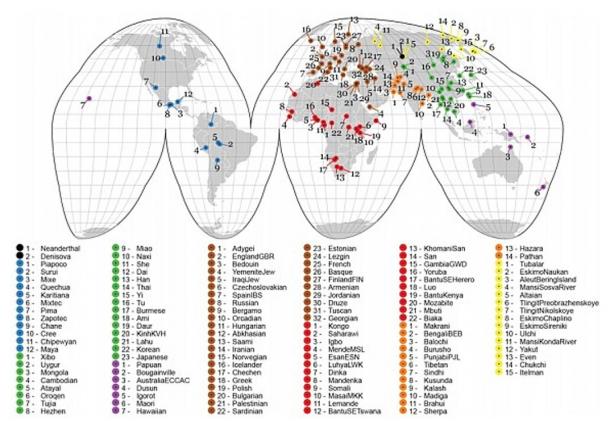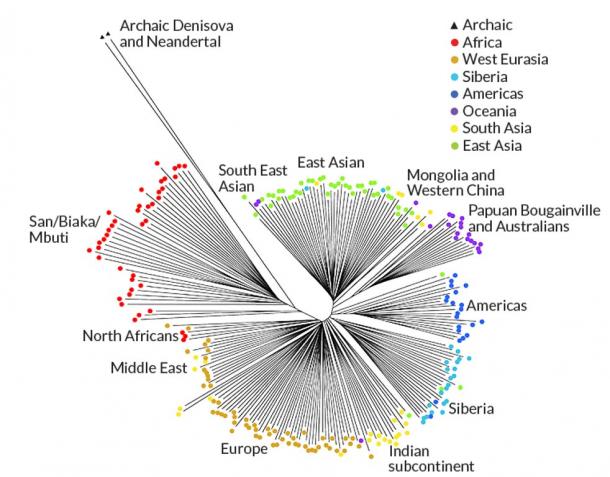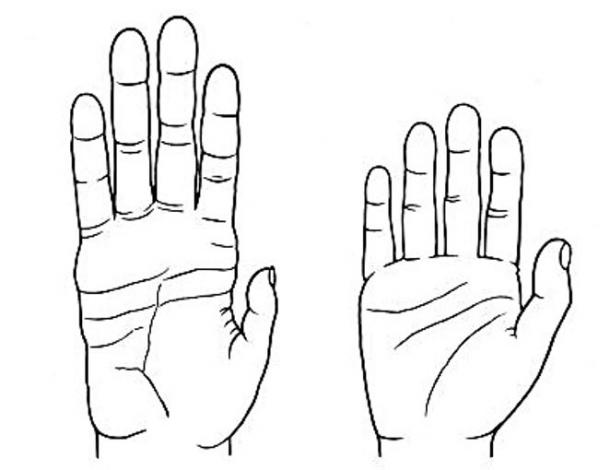Adding to the number of unsolved mysteries regarding the ancient origins of humanity and the biology of our species, scientists have discovered that we have less DNA now than our ancient ancestors possessed. Are we de-evolving?
A study published this week in the journal Science has found that modern humans lost DNA as we evolved after our split from apes. Our ancient ancestors, early humans, possessed substantially more amounts of genetic data than we do now. This surprising discovery raises many questions, the most obvious one being: why did we lose all that genetic information? Also, what difference has the loss made?
The short answer is: we don’t know yet.
According to news website Gizmodo, the team of researchers led by Professor Evan Eichler, geneticist at the Department of Genome Sciences, University of Washington, sequenced the genomes of 236 individuals from 125 distinct populations. They found that Homo sapiens have shed approximately 40.7 million base pairs of DNA after breaking from our closest living relatives, chimpanzees, around 13 million years ago.

Map of the 125 populations sampled in the study and their relation to each other. (P. Sudmandt et al 2015)
- Calcified remains of Altamura Man yield oldest ever Neanderthal DNA...
- Jawbone found in Ethiopia set to rewrite history, push back origins...
- Unusual 20,000-year-old human skull shows diversity of prehistoric ...
- White Skin Developed in Europe Only As Recently as 8,000 Years Ago ...
The genome of modern humans now contains 3 billion base pairs of DNA (complex molecules which contain all of the information necessary to build and maintain an organism, the building blocks of life), and even then scientists are unsure how much of that number is so-called “junk DNA”—genomic data whose function, if it has any, is not understood—but they do assert that at least 27.96 million of the base pairs lost were unique.

Common relationships were traced via DNA deletions among groups of humans. The longer lines show groups with more missing DNA. (P. Sudmandt et al 2015)
Have modern humans beneficially shed superfluous DNA, or have we lost something important over the generations?
Eichler proposes that a migration out of Africa reduced the human population in new areas and played a role in the loss of DNA.
Study authors write, “the breadth of the dataset allowed us to reconstruct the structure and content of the ancestral human genome prior to human migration and subsequent gene loss.’
‘As expected, Africans were more likely to show evidence of these ancestral sequences compared to non-African populations, as the latter have experienced more population bottlenecks and thus retained less of the ancestral human diversity.” Meaning that those individuals who were more connected with Africa had retained more DNA than those who had descended from migrated populations.
MailOnline reports, “The human genome has around three billion base pairs, which reside in 23 chromosomes in the heart of almost every cell in our body. The average gene in the human genome is around 765 base pairs long, meaning humans could have lost the equivalent of up to 37,000 genes since splitting from our ape cousins.”
Adding to this mix is the historic breeding of modern humans with the now extinct Denisovans and Neanderthals. Segments of Denisovan and Neanderthal DNA can be identified now in modern populations. But Neanderthals and Denisovans had around 104,000 base pairs in their genomes that are not found in modern humans. Researchers found that Neanderthals and Denisovans were missing some ancient DNA as well, suggesting these extinct species had lost significant portions of genetic code.
“Their results showed that our ancestors shed about 15.8 million base pairs of DNA before leaving Africa. As populations spread across Earth’s continents, they jettisoned additional chunks of DNA here and there. But certain populations have also been gaining DNA, mostly through duplication events where portions of the genetic code were accidentally copied and passed on,” reports Gizmodo.
- Researchers claim Neanderthals were NOT a sub-species of modern humans
- Mysterious Origins – What we don’t know about the emergence of humans
- New theory on Hobbit species has drastic implications for Out-of-Af...
While modern humans may presume that the shedding of DNA has honed us to the peak of evolutionary perfection, science can show that not all of our changes have been beneficial. In one example, research suggests that our hands are actually more primitive than those of our chimp ancestors, despite our adaptations for the use of tools.

Chimpanzee hand, at left, and human hand, right.
This is the first time scientists have documented the loss (and gain) of large chunks of DNA in ancient populations. This genetic research may shed light on the enduring questions of how modern humans evolved and survived while other hominin died out.
Scientists still can only speculate as to what these results indicate, but as more research is done we can fill in the missing gaps of our understanding of the ancient story of humanity.
Featured Image: A DNA molecule that is methylated on both strands on the center cytosine. DNA methylation plays an important role for epigenetic gene regulation in development and cancer. (C. Bock/Wikimedia Commons)
By Liz Leafloor



You need to be a member of Saviors Of Earth to add comments!
Join Saviors Of Earth